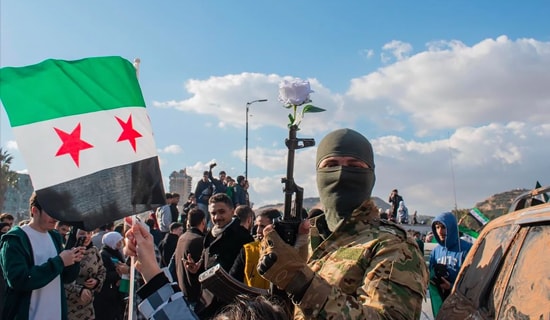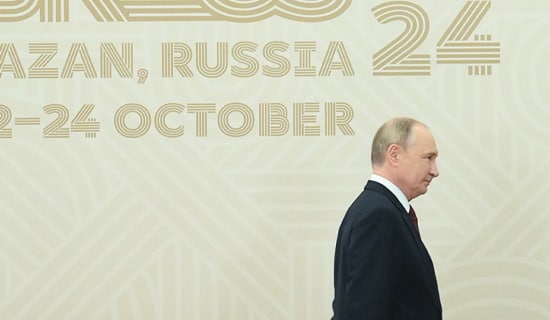As Israel was attacked by Islamic extremists from the Gaza Strip on October 7, 2023, dozens of world leaders called Israeli Prime Minister Netanyahu or expressed their solidarity with the Jewish state in another manner, except for Russian President Vladimir Putin – the two leaders did not speak until October 16.
The Russian President did admit that Israel – as any other sovereign nation – has a right to self-defense, but he proposed that Russia may become a mediator, assisting in "peace talks" between the Hamas terrorist organization and the Israeli government. Hamas praised Putin's position during the first week of the conflict and photos of the Russian leader appeared at anti-Israel rallies in the West Bank.Many experts commenting on the Kremlin's position argued that the times of "friendship" between Moscow and Jerusalem are over.

Demonstration in Hebron, on October 20, 2023 (Source: Ramallah News)
The Kremlin's Actions Are A Continuation Of Soviet Policies
The overall background that might explain the Kremlin's actions is its commitment to the Soviet (geo)political stratagems. For decades, the Soviet Union positioned itself as a "friend" to Arab states, which were seen as a Socialist-oriented nations fighting against Western "imperialism."
The Soviet Union has been providing Israel's neighbors with massive "development" assistance and armed their military with its newest equipment for decades, and these armaments were several times used against the Israeli military. The Soviet leaders admired authoritarian Arab rulers, and, I would say, this sympathy never dried up, except for a short period of President Gorbachev's rule.
Hence, it should be noted that Russia's romances with Hamas and the "Palestinian state" are in some sense a mere and simple continuation of the Soviet ones, and therefore are highly valuable for Putin who – I would remind the reader – even started his tenure in 2000 with a series of official visits to old Soviet allies – from Cuba to North Korea. In this case, Putin simply "restored" the Soviet ties and feels himself obliged to keep and develop them: It explains that he revitalized the relations with Palestinian terrorist groups long before turning into an international pariah.
Putin's relation to Israel in many cases mirrors its attitude to the Arab states and movements. The Soviet Union re-established its full-scale diplomatic relations with Israel only as late as October 1991, when it evolved into a highly dysfunctional state after many national republics, Russia included, had already declared their independence (the move was in part taken because President Gorbachev wished to participate in a high-level conference on Middle East issues in Madrid on October 30, 1991, which became his last official trip abroad).[1]
Russia And The "Jewish Question"
For Putin, such a move might seem to be one of Gorbachev's many mistakes, and he can hardly forget the Soviet attitude toward Israel as being an attitude toward a staunch U.S. ally and a source of many problems for Moscow resulting from the Soviet Union's unwillingness to allow its Jews to resettle in Israel. The fight for the emigration to Israel appeared to be one of the most influential parts of the Soviet dissident movement of the 1970s, so the admirers of the Soviet system were not Israel supporters.
Moreover, the "Jewish question" has been extremely sensitive in Russia for a long time with many Soviet (and even anti-Soviet) intellectuals arguing that the Jews were a source of many of Russia's "problems." I would cite here Alexander Solzhenitsyn's not-too-well-known book Two Hundred Years Together, a book about the history of Jews in the Russian Empire, the Soviet Union and modern Russia between 1795 and 1995.[2]
Since the early 1990s, Israel has become the primary emigration destination for thousands of highly professional Russian citizens, which caused widespread discontent in Russia: At these times there were calls made to levy a huge monetary duty on those who got "free" Soviet education and chose to leave Russia for another country. I would say that since Putin was raised in the Soviet tradition with a KGB background, he may share antisemitic views that were deeply rooted in the Soviet consciousness.
I would add here that it seems President Putin has a lot of personal anti-Jewish attitudes, which he was able to nurture during his life – stemming from the fact that most of the Russian "oligarchs," whom he blamed for the problems Russia encountered in the 1990s, were Jewish to the point that Ukraine's incumbent President, Volodymyr Zelensky, is also a Jew.
More recently, Putin has turned to the topic even more often, mentioning that Russian Jews cannot be trusted since they have a dual loyalty. Several weeks ago, he mentioned how Anatoly Chubais, a famous Yeltsin-times reformer responsible for 1990s privatization in Russia, escaped to Israel and turned from "Anatoly Borisovich" into "Moshe Israilevich." His remarks appeared to stress that his name change indicated treason.[3]
Putin often reiterates that the Jews are nice and decent people, and "he has many Jewish friends," but it is mostly said in a way of apologizing for being friends with those people, which, as many observers suggest, presupposes a kind of distrust and enmity the Russian president feels toward Jews. Of course, none of this should be taken as a ground for political decision-making, but many Jew-related remarks made by Putin aides have provoked outrages in Israel and elsewhere in recent times.[4]
Israel Is Viewed As Part of The "Collective West"
But of course, none of the above can be more important these days than a sheer (geo)political calculation, presumably made in the Kremlin.
According to Putin, Russia is at war not so much with Ukraine, which he attacked in February 2022, but rather with the "collective West,"[5] which, as believed by the Kremlin, wishes to destroy Russia because it is a "unique civilization" that has no intention of changing in the way the West wants it to.[6]
The West for Putin is dangerous and contagious also because it rejects "traditional values" and for this reason Moscow is now ready to side with anyone who opposes "the West," including most of the known terrorist groups. I would say that no one should look for a kind of logical thinking in this case, as, for example, Russia's biggest enemy in Europe is now Poland, which, at least until last weekend's elections, is one of the most religious and traditionalist countries on the continent.
Also, no one should try to understand why Russia sent its troops to Syria in 2015 to fight the Islamic State while at the same time supporting both Hamas and Taliban, inviting their delegations to Moscow even while some of these organizations are officially designated as terrorist and are banned in Russia. These days, two female artists are kept in jail in Moscow for staging a play about the fate of young Russian ladies who fell in love with Islamic fighters in Syria while at the same time Russia's Foreign Minister greets the same fighters from Afghanistan in his Soviet-built office.[7]
But what one should realize is that Putin's hate toward "the West" is so deep that these days he welcomes any defeat or challenge the West may face – and while 20 years ago he was an enthusiastic supporter of the U.S. War on Terror and provided Russian airspace and airbases for the U.S. airlift to Afghanistan, these days he orders the Russian press to celebrate the chaotic American withdrawal from Kabul.
In such a worldview, Israel represents America's ally and a home for those former (or actual) Russian citizens who dislike Putin's policies and criticize his war in Ukraine. I would mention here that Moscow paid almost no attention to the deaths of at least 16 Russian citizens during the Hamas attacks,[8] since Putin believes those who abandoned Russia at the times of war, are not his compatriots anymore.
Putin Wants To Broaden The Widespread Confrontation With The West
By attacking Israel – with or without Moscow's advice or assistance – Hamas opened a new front against the West in what Putin believes is the ongoing World War III. This attack is beneficial for the Russian "national leader" in several aspects. First, it leads to refocusing of the U.S. and European attention from Ukraine to Israel, and (as he hopes) to a decline in the Western assistance to Ukrainian army that may allow the Russians to stop Ukraine's counteroffensive and recapture the strategic advantage.
Second, Putin of course dreams of a new migration "earthquake" that can send millions of refugees from the Middle East toward the borders of the European Union. It is widely known, that Palestinians are not welcomed by their fellow Arab neighbors and would most probably seek asylum in Europe.
Third, the Israeli ground operation may create a huge wave of support for "innocent civilians" in Gaza adding to the "global South's upheaval" that Putin awaits as he positions himself as the leading "anti-imperialist" figure.
Fourth, Putin wants to broaden the widespread confrontation with the West hoping that the clash between Hezbollah and Israel may bring Iran into the expanding quarrel and therefore destabilize the entire region that is crucial for both the U.S. and Europe. Maybe he also dreams of oil prices going up because of the war, but I would not argue this aspect stays at the center of his calculations.
Conclusion
I would add to this gloomy picture that Prime Minister Netanyahu and the Israeli government have proven to be badly mistaken in assessing President Putin. For many years, Israel considered Russia if not a friend then a decent country with which one can build lasting peaceful relations, as Russia is de facto Israel's neighbor in Syria.
The Israeli government approved a visa-free regime for Russian citizens well before it did so for Ukrainians.[9] Prime Minister Netanyahu also did his best for pushing forward the transfer of the so-called "Alexander Compound" in Jerusalem to the Russian Federation, presumably in exchange for the liberation of an Israeli citizen jailed in Russia, even if this act was actively contested in Israeli courts.[10] Furthermore, Israel declined to supply arms to Ukraine to resist the Russian aggression and none of its prime ministers have visited Kyiv since the war started.[11]
However, none of these steps could change Putin's suspicious, if not hostile, attitude, toward Israel and the Jews. It comes from his past, and it seems that the past means much more for him than the future...
*Dr. Vladislav Inozemtsev is the MEMRI Russian Media Studies Project Special Advisor, and Founder and Director of the Moscow-based Center for Post-Industrial Studies.
[1] Interfax.ru/30years/795817, October 29, 1991.
[2] Imwerden.de/pdf/solzhenitsyn_dvesti_let_vmeste_ch1_2006__ocr.pdf
[3] Tass.ru/politika/18725859, September 12, 2023.
[4] Mid.ru/ru/foreign_policy/news/1811569/, May 1, 2022.
[5] Interaffairs.ru/news/show/42512, October 3, 2023.
[6] Kremlin.ru/acts/news/70811, March 31, 2023.
[7] Tass.ru/proisshestviya/18162597, June 30, 2023.
[8] Lenta.ru/news/2023/10/14/chislo-pogibshih-posle-ataki-hamas-rossiyan-vyroslo-do-16-sudba-esche-vosmi-ostaetsya-neizvestnoy/, October 14, 2023.
[9] Capricorn.ru/country/israil/visa_israil
[10] Rfi.fr/ru/%D0%B2-%D0%BC%D0%B8%D1%80%D0%B5/20220419-%D0%BF%D1%83%D1%82%D0%B8%D0%BD-%D0%BF%D0%BE%D1%82%D1%80%D0%B5%D0%B1%D0%BE%D0%B2%D0%B0%D0%BB-%D0%BE%D1%82-%D0%B8%D0%B7%D1%80%D0%B0%D0%B8%D0%BB%D1%8F-%D0%BF%D0%B5%D1%80%D0%B5%D0%B4%D0%B0%D1%87%D0%B8-%D1%80%D1%84-%D0%B0%D0%BB%D0%B5%D0%BA%D1%81%D0%B0%D0%BD%D0%B4%D1%80%D0%BE%D0%B2%D1%81%D0%BA%D0%BE%D0%B3%D0%BE-%D0%BF%D0%BE%D0%B4%D0%B2%D0%BE%D1%80%D1%8C%D1%8F-%D0%B2-%D0%B8%D0%B5%D1%80%D1%83%D1%81%D0%B0%D0%BB%D0%B8%D0%BC%D0%B5, April 14, 2023; Newsru.co.il/israel/03mar2022/podvorie306.html, March 3, 2022.
[11] Rbc.ru/politics/29/06/2023/649d1d2a9a79478fa293d00c, June 29, 2023.





